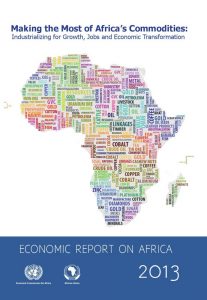Goldman Sachs has published a major report, Africa’s Turn, laying out reasons why their research team think it is time to invest in Africa. They say it is time for multinational corporations to ramp up or initiate their presence in Africa. If it is time for the big guys, medium and small investors and entrepreneurs would be wise to do their due diligence to select some choice opportunities for entrance into a market that is still off the radar of the innovation and business world.
I have gleaned the following ten reasons for investment from this article and added my own comments and a bonus reason on my own.
1. Africa’s household consumption is growing rapidly.
The day has long passed that saw the majority of Africans only consuming food they produced themselves. More and more rural farmers produce cash crops. The purchasers of tea, cocoa, coffee, milk, and many other products deposit their payments in the farmers’ bank accounts. That is not to say that they all have considerable disposable income, but they now have vary liquid assets. Adding this to the growing incomes of the urban factory and office workers, there is more cash than ever.
They are spending this cash on technology and manufactured goods that most of them never dreamed of owning. Malls are being opened all over the continent.
2. 14 African countries increased their GDP by more than 6% per year a on average over the past 5 years.
New technologies, hybrid seed and innovations are contributing to this increase. More countries from Africa rank in among the top 10 percentage raise in GDP than countries from any other continent. It is not Asia that is on the rise, but Africa.
3. Improved governmental efficiency, stability, and fewer wars.
Corruption and inefficiencies still present formidable challenges to entrepreneurs and investors alike, but government administrators are becoming more effective at cleaning up their bureaucracies. The international press gives Africa’s wars and terrorist activity more press than ever, but in reality the continent than it has been for decades.
4. Wealth is being created and is beginning to be distributed less unevenly than before.
Entrepreneurs, especially in technology and agriculture are churning out innovations that are creating new income streams and jobs. Eighty percent of all African peoples, according to a recent study, feel their lives are getting better – optimism is in the air. Cell phones are in the most remote of villages – a sign that the wealth is making its way to those who only five years ago were considered by many to have little hope for real improvement.
5. By 2030, 10% of Africa’s population is expected to be in the middle class
The report defines middle class, in Africa, as those who earn between $6,000 and $30,000 each year. The researchers go on to say that this is the same prognosis for India in five years and what China was experiencing ten years ago. So, Africa is about to garner many, new seats at the middle class table much sooner than previously expected.
6. Africa could have the world’s largest workforce by the middle of this century.
A large work force is a formidable asset. Multinational companies and entrepreneurs just getting started will have plenty of eager, easily trainable people to hire.
All of the investment in educational reform is paying dividends. Secondary schools and universities are turning out technically savvy young people. Coupled with graduates from the many technical and trade schools the pool of qualified African will make it easier for businesses to staff essential positions.
Just like China and India, Africa is beginning to become a excellent outsourcing venue.
7. Inter-Africa trade has grown at a CAGR of 19% over the last ten years
Products made in Africa for Africa may present the greatest opportunities and challenges for economic growth. Africans know what other Africans will buy, how to market to them, and what they will pay. This is not to say that there is no room for expats to join the wave of inter-Africa trade, but they must learn from African partners, letting them take the lead.
African boarders are often congested as transporters carry incomplete paper work and/or bargain for bribe payments with customs officials and boarder police. Some changes will have to be made to smooth out the procedures for obtaining proper paper work and smooth passage between countries.
8. Abundance of natural resources
Natural resources such as copper, iron, and nickel are more prevalent in Zambia, Morocco, Zimbabwe and Tunisia than almost anywhere else on the planet. Diamonds and Gold are found in abundance in Ghana, Botswana and South Africa. Nigeria, Angola, and Gabon have large reserves of oil. Without a doubt these resources will continue be an important segment of export revenue for these countries, but they also present opportunities for the development of new technologies to discover and refine them, as well as finding new markets within the continent.
9. Cultivatable land plentiful
Africa has been characterized as filled with subsistence farmers. That is still true to some extent, but as a renown investor, Jim Rogers recently said in an interview, “farmers will be driving Lamborghinis.” Maybe there will not be a lot of them in Africa, but without a doubt the abundance of fertile land still not currently being cultivated together with the existing agricultural land is so vast that it has the potential of making Africa the food basket of the world.
The land capable of food production has become scarce in the rest of the world. As the researchers point out, “the world needs Africa to
substantially improve its agricultural yields” – not only to provide food for Africans, but for the rest of us who live on this round ball called Earth.
Private capital and technological innovation are needed. However, we must be careful not to recolonize or dominate Africa to the sole advantage of the West.
10. Urbanization on the rise
According to the United Nations, forty percent of Africans live in urban centers. That is greater than India. There are more cities in Africa with 1 million or more population than in North America. Urban dwellers pay for everything they use, from houses and food to water and transportation. More jobs are being created to serve this growing population.
I would add to these 10 Reasons to Invest in Africa:
11. The African spirit
A decade or so ago most of the world, and a large number of Africans, thought the continent was going down for the count, yet she is rising quickly. Her people are resilient.
There is a new generation of young entrepreneurs who are optimistic and bright. They are not looking for handouts, but partnerships and trust. They have already brought some fantastic, life saving and life altering innovations like CardioPad (remote EKG tablet), MPesa (cellphone money transfer), teleradiology (remote x-ray technology), and Kilimo Salama (crop insurance). They are extremely capable.
Seek out the best of them, or let Africa Mentor help you find them, and partner with them.







